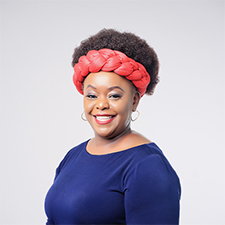Millie Odhiambo became captivated by politics at a young age but nearly abandoned the interest because traditional Kenyan society discouraged girls from becoming elected officials. Fortunately, others encouraged the human rights lawyer to follow her passion, and in 2008 she became one of the country’s first female members of parliament. Since then, she has introduced numerous bills and built a reputation as a fierce advocate for women, girls, and youth.
“I came [to politics] at a point when women were not at the table,” says Odhiambo, who was named minority whip in August 2024. “I am thrilled because we are now at the negotiating table, we are now hearing more women voices, and we are seeing more changes.”
We recently interviewed her for a report by the Oliver Wyman Forum, Women Political Leaders (WPL), and the World Bank’s Women, Business and the Law on the positive impact of having more women in political offices.
You’re now among the best-known and most senior officials in Kenya. What were those early years like, and how has it changed since your first election?
It has been a very difficult journey. I’m the longest-serving woman member of parliament in my country and one of the longest-serving members of parliament, but it has not been easy. At every stage, I’ve dealt with issues of socialization, both by the men and the women, and a culture that tries to hold me back.
I had a lot of things going against me when I was vying. I was considered relatively young in my early forties, which is not young. Secondly, my husband doesn’t come from Kenya. He comes from Zimbabwe. I was told I should go to my husband’s country. And I was shocked when I was told I cannot lead because I have no child.
I’ve decided that my journey as a leader is not just to serve my community, but to serve the trajectory and the narrative about women in leadership. So, I’m doing a twin approach. I’m serving my constituency, yes. But I am also trying to transform women in leadership.
Kenya has a two-thirds rule where at least a third of its officials in parliament should be female. While it’s still not yet meeting that goal, what changes have you seen so far?
Because of that [goal] we have increased voices of women in the National Assembly and the Senate. And in the National Assembly, there’s a special fund for elected members for community development, which is called the National Government Constituency Development Fund, and it focuses on only education and security.
The other positive thing is the women who have come in, even in the affirmative action seats, are now also bringing bills that seek to empower women further. Right now, as we speak, one of the women in the Senate has brought up a bill to compel the government to provide free sanitary towels because it has been documented that a lot of our girls drop out of school because of period shame because they’re not able to afford sanitary towels.
You’ve become a TikTok sensation in a video where you advise women not to be bound by societal expectations, not to be “a good girl.” Tell us about that.
I went there [Parliament] with a purpose, and the purpose was to put an imprint of women in the constitution and in other legislation and in perspectives. Very recently, there was a TikTok that went viral where the speaker kept trying to shut me down. He would say: You are the grandmother of the House, and you should be setting a good example for the young ones here. They look up to you. You must behave with decorum.
I told him, no, my favorite book is “Nice Girls Don’t Get the Corner Office.” I’m a bad girl. You are not using religion and the culture to hold me back. And it has just created a bad girl movement in the country. And I’m so happy because it has encouraged young girls to suddenly have a lot of interest in politics.
What is your advice to other women interested in getting active in politics?
My advice to the other women is: We must all be interested in politics, we must all be interested in governance. In Kenya, because of socialization, you’ll discover that a lot of young women are in sectors where they show their beauty and their elegance and their nurturing and caring roles. But what we considered hard areas are preserved for men.
What we need to do is get women and girls interested in those [hard] areas. And for me, through the Gen Z movement and this accidental bad girl thing, it has given us an opportunity in Kenya to have conversations about getting young women interested in politics.


